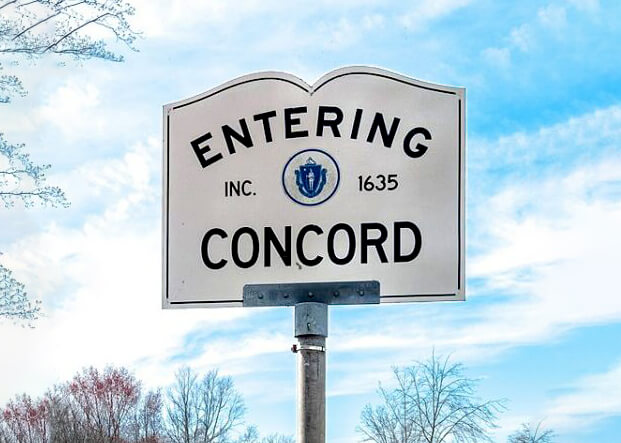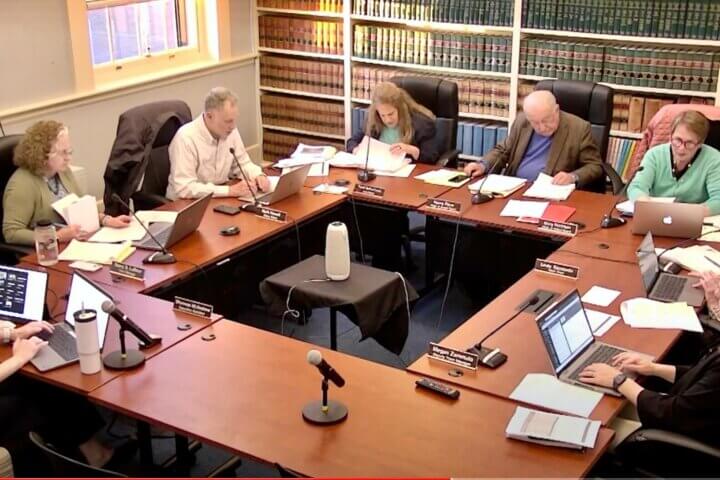Citizen petition articles on the Town Meeting warrant came under scrutiny at the Select Board hearing this week.
Josh Lee and Rose Felix Cratsley, co-chairs of town’s DEI Commission, are urging the Select Board and Town Manager to hire a full-time director of diversity, equity and inclusion.
Lee said the volunteer DEI Commission needs the addition of a senior management position to continue the work of making Concord a “welcoming” place. He said discrimination and bias are “realities in town.”
The director would amplify the work of the two-year old volunteer commission, to gather data and draw up a system for incident reporting as well as support cultural events and more.
“It needs to be prioritized and resourced,” said Cratsley.
But the article faced pushback from residents who say the town should not add to the budget with potentially expensive new hires, especially in the wake of the tax hike due to the middle school construction. They urged the Select Board not to support the article The town has a DEI consultant already on board.
Select Board Chairman Matt Johnson suggested that a regional approach, patterned after the regional housing office, might work well without the need for the town’s own DEI director.
Dean Banfield is proposing Article 22 calling for a limited-duration solar generation task force to “create a development plan for municipal in-town solar energy generation consistent with the goals of the 2020 Climate Action Plan.”
Banfield said the task force would identify local sites for solar installations that minimize tree removal; address technical “challenges on the local distribution network;” provide a financial analysis of business models for development and deployment; and draw up a schedule to meet the 2030 solar capacity targets and an assessment of feasibility.
He said the New England power grid is “robust,” but it would be cost-effective to generate energy in our own backyard.
“We haven’t added any solar since 2017,” said Banfield. The municipal light plant would implement the task force’s plan, he said.
Two articles brought by Sven Weber to cut down on outdoor noise faced stiff opposition.
Article 36 seeks to “rename” the existing construction noise bylaw to encompass the town as a whole. It would limit weekday noise to the hours of 7 a.m. to 8 p.m. on weekdays; 9 a.m. to 5 p.m. on Saturdays; and make Sunday a “quiet day.”
Outside of those hours, “It shall be unlawful for any person or persons to create, assist in creating, continue or allow to continue any loud noise which either annoys, disturbs, injures or endangers the reasonable quiet, comfort, repose or the health and safety of others” the article reads.
The existing construction noise bylaw does not provide for a day of quiet, said Weber.
But Johnson said the proposed article “could be problematic.”
“It seems more restrictive” than constructive, he said.
Resident Joe Palumbo said Sunday was a day many people, including farmers and landscapers, get to work at their own homes. Others rose to the microphone to call the article vague, “draconian,” and a “solution in search of a problem.” They urged the board not to support it.
Weber’s other article on phasing out the use of handheld, gas-powered leaf blowers got the same pushback. The article states that gas-powered leaf blowers could only be operated from mid-March to May 31, and again in mid-September to the end of the year, and would be “prohibited at all other times.”
By 2025, commercial landscapers would be prohibited from using the devices, and by March 15, 2026 the use of gas-powered handheld leaf blowers for residents on their own property would be banned.
Reaction was swift. Homeowners said battery-powered leaf blowers, while quieter, are expensive to maintain and often don’t have sufficient power to tackle their lawns and driveways. Local small business landscapers charged that the article would seriously curtail their businesses, and not permit them to take care of their homes. The greens-keeper and general manager of the Concord Country Club said via Zoom that the article would hinder their ability to maintain the golf course.
Other articles concerned the Personnel Bylaw, an easement on Plainfield Road, an amendment to the Historical Commission’s timeframe for addressing the demolition review process, and confirming Concord’s intention to adopt the Department of Energy Resources’ stretch code of 2022 which means that “new homes over 4,000 sq. ft. and certain mixed use and commercial projects must follow the all-electric or zero energy pathways.”
The Select Board will make its recommendations on supporting or opposing the petition articles at a later date.





